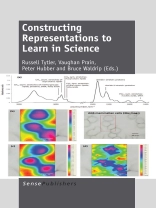Constructing Representations to Learn in Science Current research into student learning in science has shifted attention from the traditional cognitivist perspectives of conceptual change to socio-cultural and semiotic perspectives that characterize learning in terms of induction into disciplinary literacy practices. This book builds on recent interest in the role of representations in learning to argue for a pedagogical practice based on students actively generating and exploring representations. The book describes a sustained inquiry in which the authors worked with primary and secondary teachers of science, on key topics identified as problematic in the research literature. Data from classroom video, teacher interviews and student artifacts were used to develop and validate a set of pedagogical principles and explore student learning and teacher change issues. The authors argue the theoretical and practical case for a representational focus. The pedagogical approach is illustrated and explored in terms of the role of representation to support quality student learning in science. Separate chapters address the implications of this perspective and practice for structuring sequences around different concepts, reasoning and inquiry in science, models and model based reasoning, the nature of concepts and learning, teacher change, and assessment. The authors argue that this representational focus leads to significantly enhanced student learning, and has the effect of offering new and productive perspectives and approaches for a number of contemporary strands of thinking in science education including conceptual change, inquiry, scientific literacy, and a focus on the epistemic nature of science.
Inhoudsopgave
Acknowledgement; 1. Representing and Learning in Science; Making Science Visual; The Path to a Representational Focus; 2. Teachers’ Initial Response to a Representational Focus; Research Guiding Our Early Studies; Teacher Survey; Case Studies; Discussion; The IF-SO Framework; Conclusion; 3. A Representation Construction Approach; Background to the Teaching and Learning Approach; The Research Methods; A Representation Construction Approach to Teaching and Learning in Science; Impact of the Approach on Student Learning; Conclusion; 4. Structuring Learning Sequences; The Sequences; Discussion; 5. Learning Through the Affordances of Representation Construction; Learning Through Representation Construction; Theorizing How Material and Symbolic Tools Support Learning in Science; Learning Through Student-Generated Representations; A Lesson on Evaporation: Illustrating the RCA Framework; Discussion; 6. Reasoning in Science Through Representation; Accounts of Reasoning in the Literature; Characterizing Reasoning; Case 1: A Unit on Evaporation; Case 2: Animals in the School-Ground; Reasoning Through Representation; 7. Models and Learning Science; Models and Modeling in Science; Uses of Models in the Science Classroom; Case of Lyn & Sally: Teaching Astronomy; Case of Therese: Teaching Ideas about Matter; Teacher Support of Modeling; Conclusions; 8. Teacher Perspectives of a Representation Construction Approach to Teaching Science; The RILS Teachers; Support for Teachers in Implementing a New Pedagogical Approach; The Cases of Lyn and Sally; Issues Related to a Wider Acceptance of a Representation; Construction Teaching Approach; Conclusion; 9. Assessment; Literature on Assessment in Science; Case Study of Liz: The Topic of Motion; Case Study of Lyn and Sally: The Topic of Astronomy; Conclusions and Implications; 10. The Nature of Student Learning and Knowing in Science; Learning as Participating in and Engaging with Practice; Animals in the School Ground; 11. Implicationsfor the Future; The Implications of the Research Findings for Curriculum Policy; Widening the Scope; Scaling Up the Approach; 12. Representations and Models: Aspects of Scientific Literacy; Components of Scientific Literacy; Representations, Models and Teaching; Representations, Models and Learning; Forging Relationships Between Representing and Modelling; Some Conditions for Successful Learning; References.












